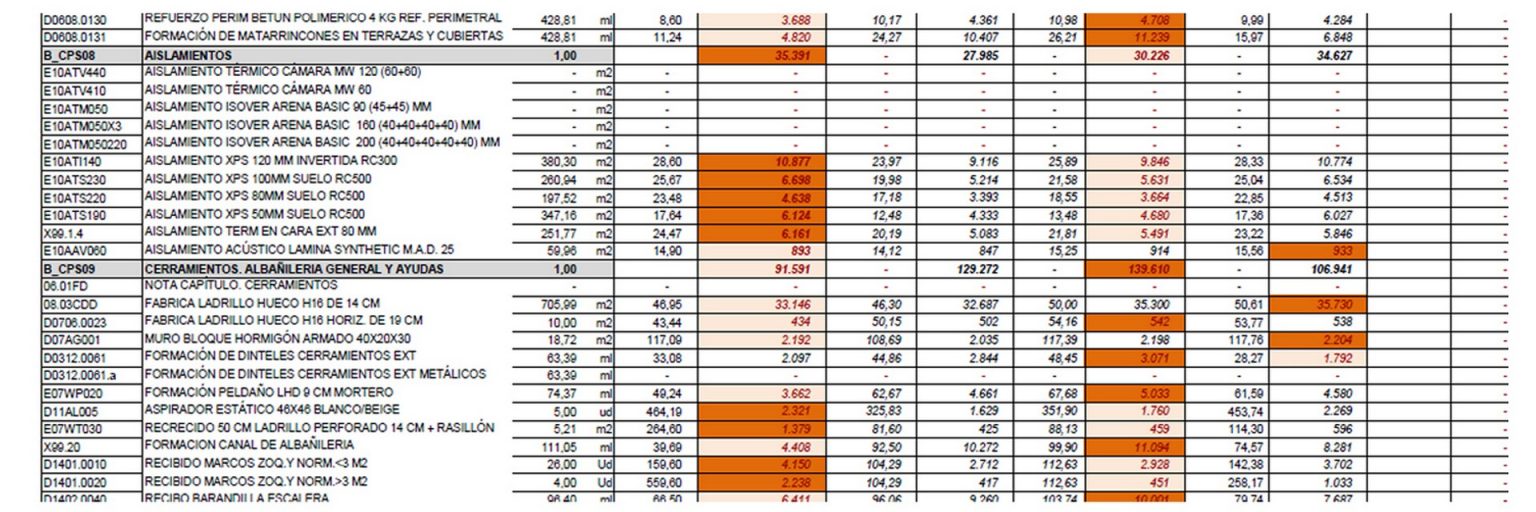Total Building Costs
Realistic and Transparent

A realistic approach to the overall costs is essential when undertaking a construction project in Mallorca. Unlike in other countries, Spain does not apply a unified national standard for cost planning or calculation.
For practical purposes, costs can be divided into construction costs and their ancillary costs, together with the taxes and fees associated with the building process.
- Construction Costs
These are the direct costs of erecting the building – the total of the amounts paid to contractors. Construction costs are always stated net of VAT (IVA) but calculated on the basis of gross floor area.
General Contractor or Project Management?
The use of Project Management rather than a general contractor makes the construction process more controllable and flexible, with more favourable cost development and, above all, greater transparency.
Project Management fees are lower than the mark-ups of a general contractor and are included in the construction costs.
- Ancillary Costs – Professional Fees and Insurance
These include all professional services and insurance necessary for the construction process. They cover the fees and premiums for:
- Architect – design and site management (Arquitecto Superior – Director de Obra).
- Technical Architect – site supervision (Arquitecto Técnico / Aparejador – Director de la Ejecución de la Obra).
- Surveyor (Topógrafo).
- Health and Safety concept and coordination (Coordinador de Seguridad y Salud).
- Energy certificate.
- Review and stamping by the Architects’ Association (Visado Colegial by COAIB).
- Seguro Decenal (Ten-Year Insurance), including mandatory structural quality control. Strongly recommended, as it is required if the house is sold within ten years. Retroactive policies are disproportionately expensive.
Depending on the project, further specialist planning may also be advisable:
- Building services engineering (Ingeniería).
- Landscape design (Paisajismo).
- Interior design (Interiorismo).
- Agricultural engineering for rural land (Ingeniero Agrónomo, en suelo rústico).
- Other specialists in pools, lighting, home automation, acoustics, or security.
- Additional insurance cover.
- Ancillary Costs – Taxes and Fees
Every project is subject to municipal taxes and fees. The calculation basis is the PEM – Presupuesto de Ejecución Material (Construction Execution Budget), determined according to the cost scale of the COAIB – Colegio Oficial de Arquitectos de las Islas Baleares.
Each municipality applies its own percentage rates to the PEM, and the total amount of taxes and fees generally ranges between 4% and 7%.
- Tasa Urbanística (Building Permit Fee).
- ICO – Impuesto de Construcciones, Instalaciones y Obras (Construction Tax).
At final inspection, municipalities increasingly require comparison between declared PEM costs and actual invoices. On any difference, additional ICO tax may be levied.
For excavation, demolition, and waste management, a contract with MAC Insular must be signed and a financial guarantee (aval) deposited with the Consell de Mallorca.
- Waste management guarantee (Aval).
- Disposal costs.
Further charges may apply depending on the site, municipality, and utility providers, for example:
- Utility connections.
- Road closures or temporary road occupation.
Depending on the agreement, these costs may be borne either by the developer or by the contractors.
- PEM – Presupuesto de Ejecución Material
The PEM is calculated according to the official COAIB cost scale and is usually significantly lower than actual construction costs.
It must be declared for every project and serves as the reference basis for all administrative procedures.
Between 2021 and 2025, the PEM reference value has risen by more than 40%.
- Construction Costs and Market Prices
Although construction costs have continued to increase, the sales prices of high-quality finished properties have risen even more. Building in Mallorca therefore remains an economically attractive investment.
- Our Approach to Cost Transparency
An extensive archive of completed projects over the last 15 years enables detailed tracking of price developments.
From the concept phase, realistic calculations are prepared that take all costs into account and are continuously updated throughout the project.
Project Managers work directly with individual contractors, with payments made strictly according to performance. General contractor mark-ups are avoided.
The objective is to ensure complete financial transparency at every stage – from plot acquisition to handover and throughout the warranty period.
Conclusion
The budget of a construction project in Mallorca is composed of construction costs, ancillary costs, taxes, and fees.
Despite rising construction costs, building remains economically attractive as the value of premium properties has grown at least as strongly, if not more dynamically, in recent years.
With forward planning, high construction quality, and transparent cost control, a project in Mallorca is not only an exceptional home but also a secure long-term investment.